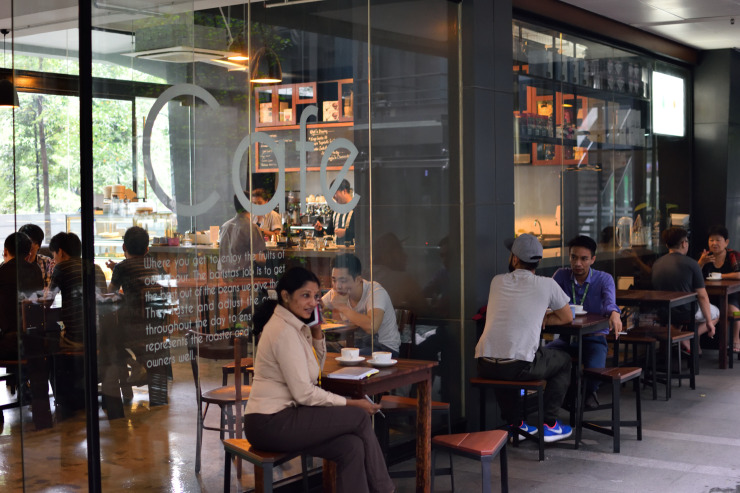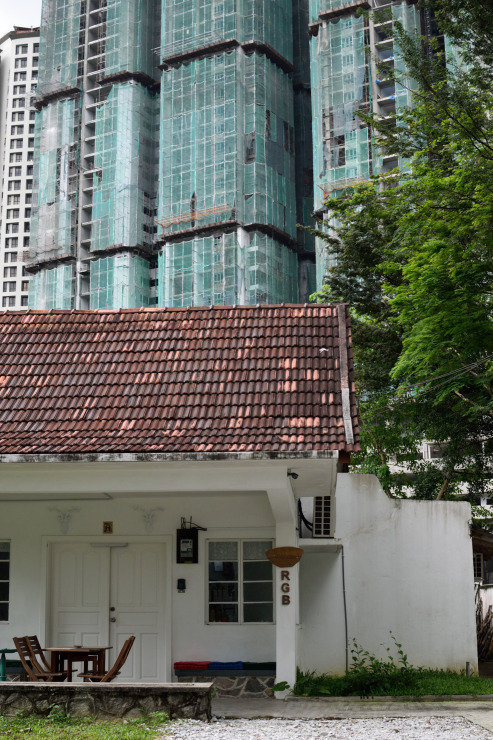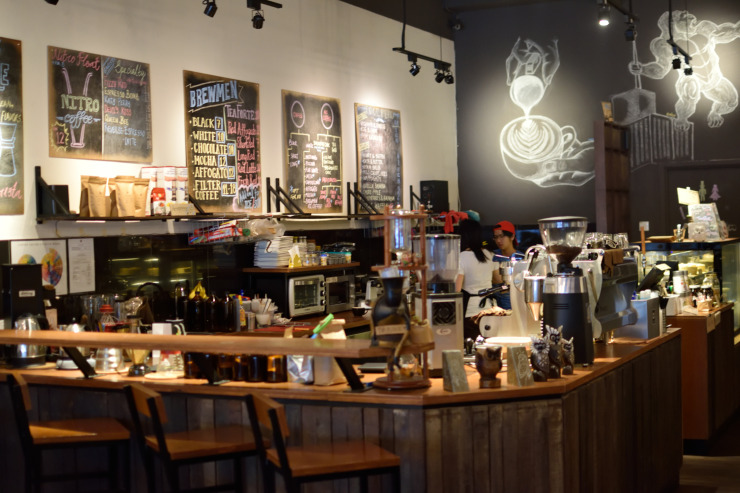Malaysia holds a curious position in Southeast Asia. As I watch the sunset glowing on the thunderheads and listen to the adhan echo between skyscrapers and through Chinatown, I can’t help but feel this is a unique place—one with a history it will take me years to comprehend.
Though Malaysia lies between the Tropic of Cancer and the Equator, coffee has never been a large export crop. Even so, exports continue to increase, and internal consumption is increasing as well. Aside from those nearby thunderclaps, what is exploding here is the cafe scene, with Kuala Lumpur’s cafes following fast on the coattails of Singapore’s sizeable specialty coffee expansion.
I made a point to visit as many of the city’s roasters as possible during my short stay, and I was surprised at the variety and depth of a scene so young. Though by no means exhaustive, below you will find a rough guide to Kuala Lumpur roasters.
Three Little Birds
I leapt out of the cab taking me to Three Little Birds, and into a torrential downpour. For a Seattleite, someone supposedly conditioned to rainy climates, tropical rain is a swift kick in the pants from Mother Nature. Briefly, I was soaked to the briefs.
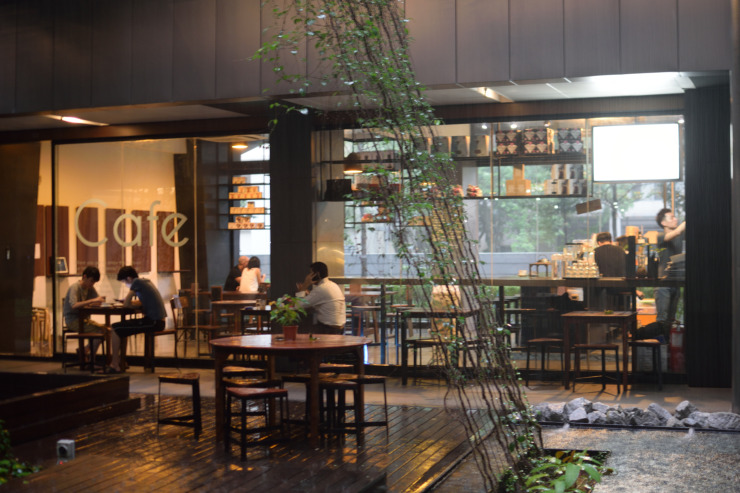
Co-owner Joey Mah was behind the bar as I approached it, and he served me a few charming coffees in his charming space. As I sipped a Kenya made in a Hario V60 (the filter expertly cut into the shape of a bird), I admired the cafe’s sightlines: one can look straight through the building, and into a nicely designed courtyard. As I sat in the cafe, heavy rain outside augmented the fountain installation, the Kenya Gachika’s crystalline brightness lightened my rain-induced heaviness, and Joey took me to see the rest of the space.
Three Little Birds is divided into three (not so little) spaces: the roastery, storage, and the cafe proper. In the roastery space a Loring stands near a Victoria Arduino Black Eagle, both prepared to take on the Malaysian Barista Championship on January 23, 2015. Ample natural light bathes both, and makes this room perfect for cupping. In the storage space, green coffee waits to be roasted, and freshly roasted coffee awaits delivery to many accounts.
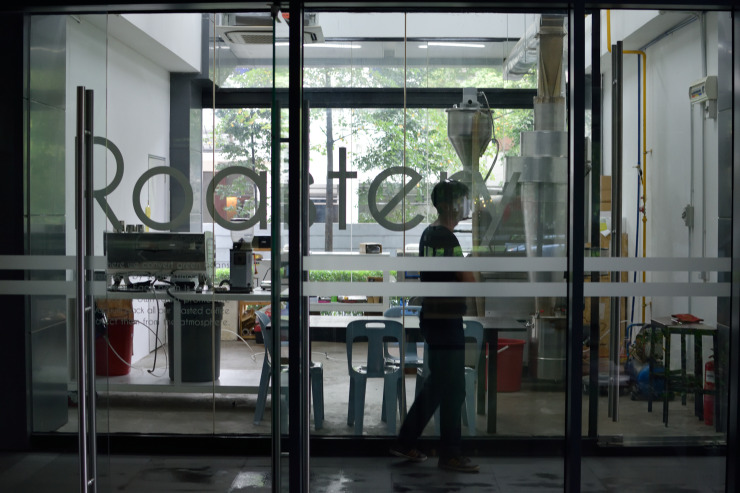
As we return to the cafe area, Mah makes me two single origin espressos; an El Salvador Finca La Providencia pulp natural and a Bolivia Illimani. As I taste the coffees, he relates that he loves flavors and how they “come together and excite us when we get a good cup of coffee.”
“When we drink a cup of coffee, we enjoy different parts of it; the the aromatics, the body, aftertaste and flavors. When we break it down into different parts, we enjoy it in different layers. And in the end, we can understand how they become harmonious.” Mah could very well be describing his cafe, too. The three spaces work together fluidly to illustrate the path coffee takes from burlap to ceramic, and onto our waiting palates.
Three Little Birds is located at D7 Jalan Sentul, Sentul 51000, Kuala Lumpur.
RGB & The Bean Hive
RGB is hidden behind towering skyscrapers, away from major thoroughfares on a street aptly named Jalan Damai or ‘Peace Street.’ As I walked down a mossy sidewalk and into the quiet neighborhood behind a large construction site, I found RGB waiting quietly.
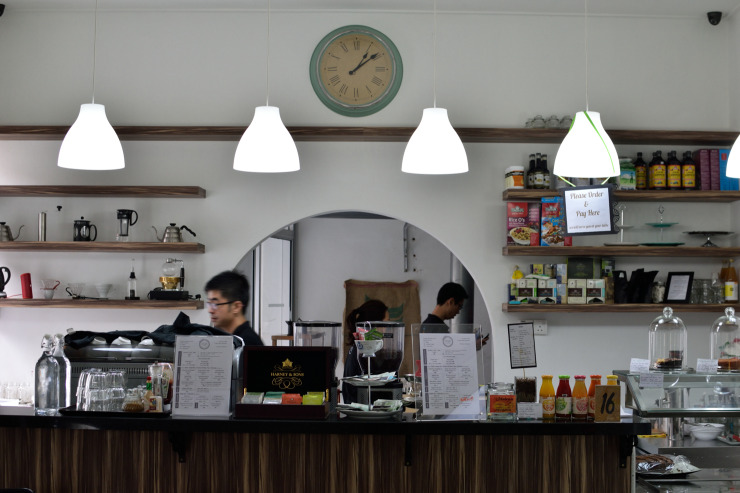
The space is divided into three rooms, with an atrium in the center casting natural light. Comfortable chairs and a selection of books caught my eye, as did a single origin Sulawesi Toraja coffee being served as espresso. Their 5-kilo Diedrich roaster peeks out from an alcove behind the counter, awaiting the next batch. This location was previously a very popular Italian restaurant, and many customers wander in expecting their old haunt. After tasting their coffee, I doubt these folks would be disappointed if they stayed a minute for a cup.
I sat down with their barista, Jared, and talked about the specialty coffee boom, and some of his favorite cafes. He was clearly in tune with the local coffee scene, and turned me on to Cafe Hop KL, a website that documents cafes throughout KL and puts them on a map for easy access. I was quickly overwhelmed. “So… you’re going to visit all of these?” quipped Jared, a smirk spreading across his face as hundreds of cafes populated the map.
Perhaps not this time; but I’ll be back, with RGB on my short list for a return trip in the future!
The Roast Things
During my time in Kuala Lumpur, I heard about the Sunday “Mari Market” at APW Bangsar. As it was just a short walk, I visited after having a splendid vegetarian brunch with my good friend Paulius Staniunas, who clued me in to this weekly happening. Paul, who runs All Is Amazing, has his finger to the pulse of KL.
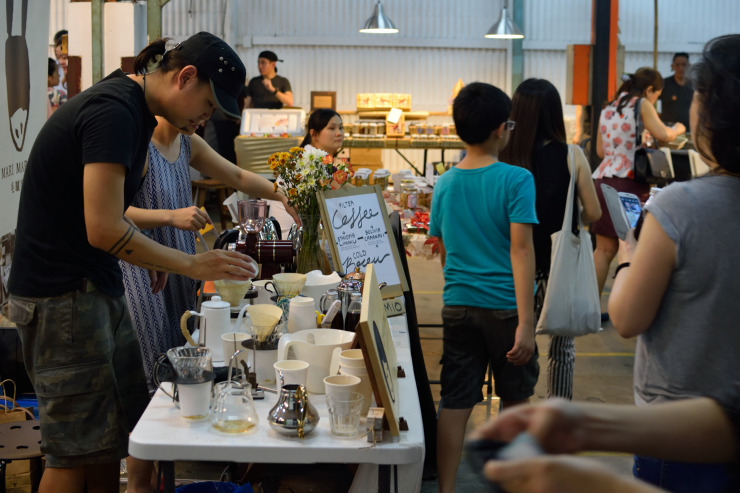
Rounding a corner past spinning potter’s wheels and fresh vegetables, I came across two people hustling to brew as many Hario V60 drippers as possible for their thirsty customers. This stall was obviously quite popular, and people were happy to wait. Ving Lim, who was working there at the time, greeted me kindly through the fray.
Lim founded Coffee Famille in 2011, but has since moved on to become the lead roaster for The Roast Things, who focus on roasted coffee, retail, and workshops on coffee sensory analysis. Lim first started working with coffee in 2007 as a barista in Taiwan. Her boss and mentor introduced her to specialty coffee, brewing techniques, and the roasting process.
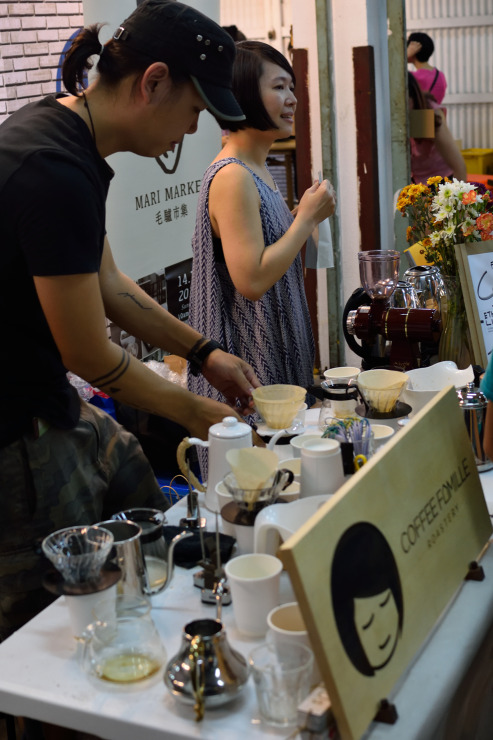
Lim has seen Kuala Lumpur’s coffee boom from the start. “What I like and find most unique about the coffee scene in Malaysia is that there is a huge variety and background. Most of the industry people in Malaysia learned from and made reference to many different countries, such as the USA, UK, Australia, Scandinavia, Japan, Taiwan, and Korea. It is interesting to see people from various coffee backgrounds in an industry sharing different insights to coffee.”
Lim’s views on roasting coffee are open-minded. Similar to the growing coffee scene here, her influences are taken from as far afield as the coffees being roasted. Lim states, “There is no one fixed roasting profile for all coffees, as some coffees can take different profiles to showcase a different attribute.”
The Roast Things and other denizens of coffee in Malaysia hope to spread knowledge of all the facets of quality coffee. Beyond holding sensory workshops, they also host roast workshops. Keep an eye out for more coffees from these folks.
Sprezzatura
My trip to Sprezzatura was interesting, to say the least: the taxi driver seemed lost, and perhaps under the influence of a whole galaxy of uppers, downers, screamers, and laughers. Nevertheless, I arrived in one piece, ready for a good coffee.
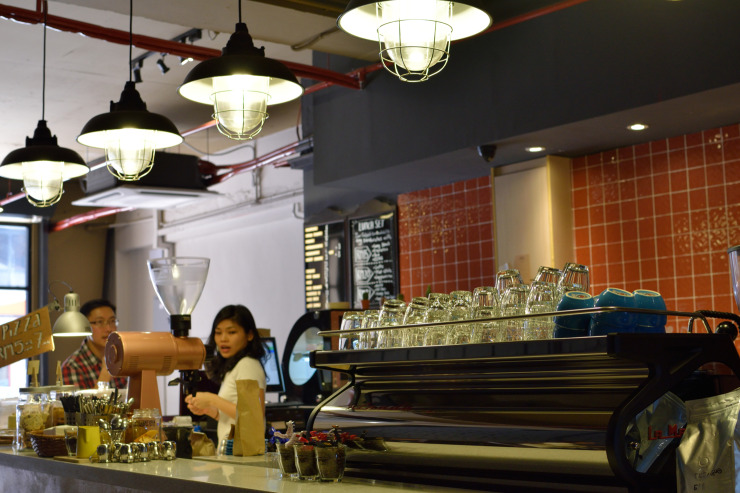
The space calmed my nerves, and reminded me favorably of some of the more comfortable cafes I’ve frequented. Being a Friday afternoon, only a few local workers were ordering coffee and pastries, the rest being at salat ul jumu’ah, the Friday prayer required for all Muslim males. There were enough drinks to keep the single barista quite busy, however. That barista, Jamie Chin, was also responsible for roasting a few batches on their Probatino roaster during slow moments.
As Chin relates, the coffee scene in Kuala Lumpur is still in its infancy. She points out that many events are helping to promote specialty coffee within Malaysia, including a screening of A Film About Coffee and the newly founded Malaysia Barista Championship. The winner from the 2015 MBC will be the first Malaysian to enter the international coffee competition scene.
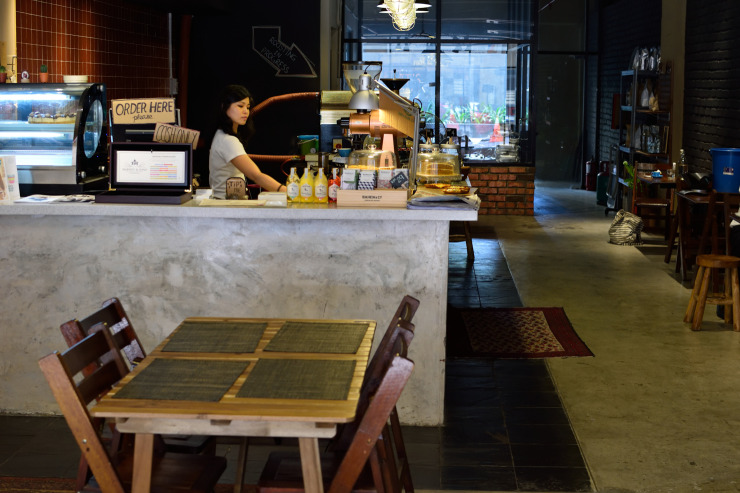
Chin entered the coffee business less than a year ago, but is already roasting coffee and working behind bar by herself. Previously, she worked as a pre-school teacher for nine years and bases her approach to roasting off her approach to teaching. Both require “tremendous amounts of patience.” Having worked with pre-school aged children myself, I understand that a strong hand at multitasking also bridges these disciplines. It is clear to anyone watching, however, that Chin has entered ‘the zone’ that baristas frequently talk about. She flits deftly between Mazzer and Strada, EK43 and register, not missing a beat.
Furthermore, my AeroPress of Ethiopia Kochere was to die for.
Sprezzatura carries a wide variety of coffees sourced from Olam, Mercanta, De Gayo, and others. They’ve been open for a little over a year, and plan to install to a 16-kilo roaster soon. Kuala Lumpur is hungry for specialty coffee.
Sprezzatura is located at Phileo Damansara I, 46530 Petaling Jaya, Selangor.
Brewmen Coffee
As my luck had it Jeremy Chan, owner and roaster at Brewmen Coffee in Solaris Mont Kiara, was at his cafe when I stepped in. Students and locals milled about, and his baristas served me a nice espresso. Brewmen has been open for a year now, and the staff seem well attuned to the rhythm of a cafe. During a slow moment in service, the baristas set up some cups of a potential new coffee (Burundi Kiramiru AA), and tasted through them.
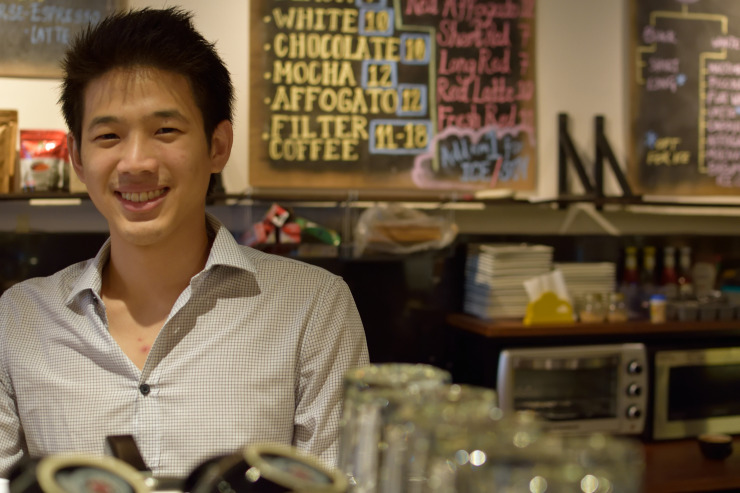
Brewmen serves a wide variety of drinks, and the one that caught my eye (and tongue) was their nitro cold brew. Being in Southeast Asia for more than six months, I hadn’t had a proper Guinness for a while; this coffee acted nearly the same in slaking my thirst for a mellow, rich brew with a creamy head. This was a life-saver after walking through the heat.
I sat down with Chan and he told me a little about his experience with coffee. “It all started in Melbourne,” he said. “I still remember when I first walked into a specialty coffee shop, the smell of freshly roasted coffee overwhelmed me. My first sip was out of this world, I couldn’t believe it was coffee. I was met with a delightful surprise of a wine-like texture which I found absolutely unique. I then progressed from patronizing cafes to buying equipment for home brewing and finally working in a cafe.” He was hooked.
Having spent so much time in Melbourne, Chan attributes a lot of his influence to noted coffee competitor Matt Perger of St. Ali Family, and keeps his ear to the ground of the coffee scene for more developments. Many baristas and coffee industry people in KL have traveled overseas and seen the specialty coffee industry in places like Australia or the United States. They return to Malaysia from their jobs or studies and they’re “bringing back what they’ve seen, heard, and experienced, which is great for the industry in KL,” says Chan. “We’ve come a long way from local coffee, which is usually darkly roasted beans laced with margarine,” he adds. He keeps an open mind, though, adding “there is no one way to make the perfect cup, it’s all about making it your own.”
Kuala Lumpur is swiftly tailoring its own version of specialty coffee and exposing a whole new audience to new ways of understanding coffee. During my stay here, I was taken aback by the enthusiasm and skill of the baristas and roasters I encountered. Malaysia is drawing inspiration from the experience of specialty coffee its citizens have abroad, and creating a new experience all its own. I know when I return, my experience here will be truly Malaysian.
Evan Gilman is an American coffee professional based in Indonesia. Read more Evan Gilman on Sprudge.
The post 5 Coffee Roasters To Visit In Kuala Lumpur appeared first on Sprudge.


